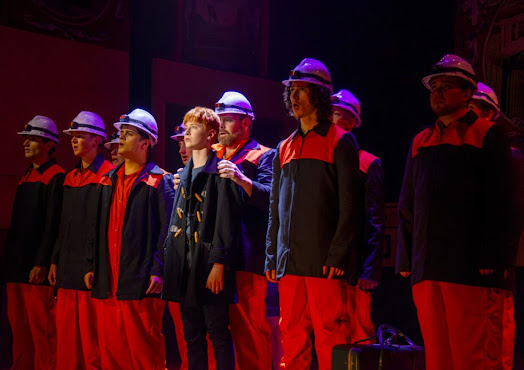Wesley Uniting Church, Forrest, 21 April 2024
Reviewed by Len Power
Promising stormy vocal works by Baroque composers, Apeiron Baroque presented works for voice by Ariosti, Vivaldi, Handel and Hasse. In addition, there were instrumental works of other baroque era composers Biber, Uccellini, Cazzati, Vilsmayr and Bononcini.
The instrumentalists were John Ma, violin, Marie Searles, harpsichord, Lauren Davis, violin, Brad Tam, viola, Clara Teniswood, cello, and Henry South, double bass, with Tobias Cole, countertenor, performing the vocals.
Both John Ma and Tobias Cole gave the audience interesting and often entertaining and funny insights into the works they were about to perform. The works themselves required different combinations of instruments.
Commencing with il Naufragio (the Shipwreck) by Attilio Ariosti, Tobias Cole, countertenor, and the players created an atmosphere of the terror and heartbreak of a shipwreck. The last part of the work, the Largo, was especially memorable with its calmer beauty tinged with regret. It was played and sung with a moving sensitivity.

Tobias Cole
All of the players with countertenor, Tobias Cole performed Mea Tormento, properate! (My torments hurry) by Johann Adolph Hasse. The dramatic and emotional allegro was followed by a reflective Lento that Tobias Cole performed with notable tenderness.
 |
| John Ma - photo by Joris-Jan Bos |
The other instrumental works by Cazzati, Bononcini, Purcell and Handel were given fine performances. The work by Heinrich Biber was especially interesting as the performers all plucked the strings of their instruments, creating a pleasing ambiance for the work.
The Aria and Gigue by Johan Joseph Volsmayr began as a beautiful violin solo by John Ma. Suddenly, unseen violins could be heard off to the side and behind the audience, creating an echo effect that was unexpected and delightful.
The concert finished with Vivaldi’s Cantata, Cessate omai cessate (Cease, now cease) with all of the players and Tobias Cole. This emotionally dramatic work was given a strong, heartfelt performance by Cole, especially the aria, In the Horrid Cavern.
This tour through the baroque era with these composers was a thoughtfully devised and entertaining program. It was given well-earned applause by the near capacity audience.
This review was first published by Canberra CityNews digital edition on 22 April 2024.
Len Power's reviews are also broadcast on Artsound FM 92.7 in the ‘Arts Cafe’ and ‘Arts About’ programs.








